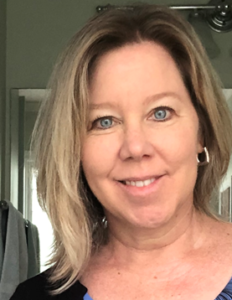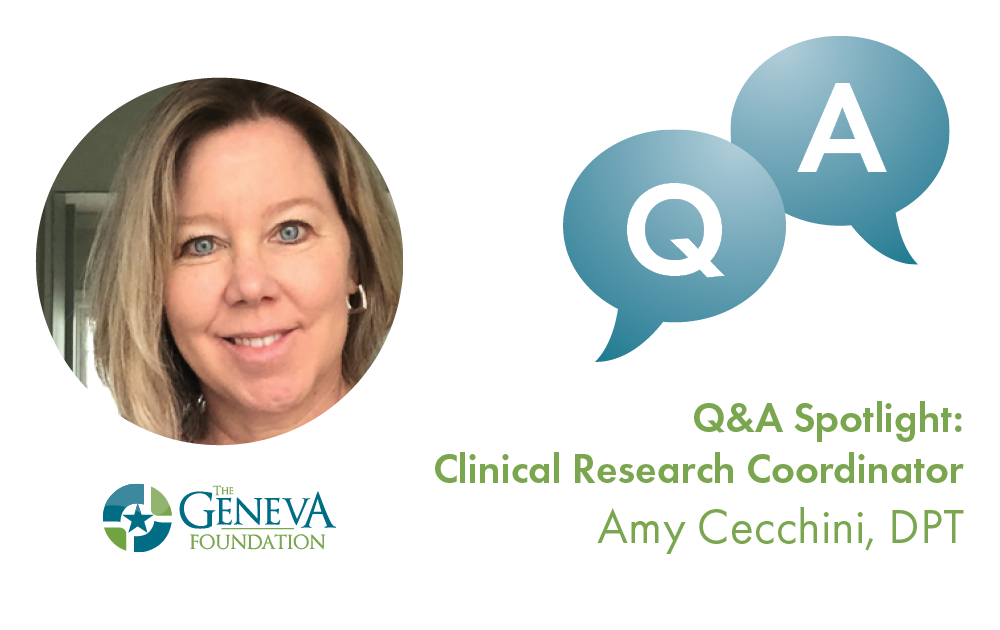10 December 2021
The Impact of a Clinical Research Coordinator: Q&A With Amy Cecchini, DPT
The clinical research coordinator oversees and administers research studies and associated activities. They assist in project planning and ensure that pre-established work scope, study protocol, and regulatory requirements are followed. They may recruit and coordinate research subjects, as appropriate, and serve as a principal administration liaison for the project. They oversee and coordinate administrative and staff services to investigators as well as develop and maintain record-keeping systems and procedures.
Geneva’s clinical research coordinators are integral to the success of the research program. We spoke to Geneva Clinical Research Coordinator Amy Cecchini, DPT about her role and the impact it has on military medicine.

Please briefly explain your job.
I’m a physical therapist (PT) first and foremost with approximately 30 years of experience. My primary interests have always been in neurologic PT, especially traumatic brain injury (TBI). As a research coordinator/research physical therapist, I was able to integrate my clinical experience with more recent research experience, and life experience as a military spouse, to help develop the study protocol and procedures following the project from funding application through all phases, now to manuscript preparation. As a coordinator, I oversaw the training of research staff at a second site, managed the regulatory components, coordinated and refined recruitment procedures, assisted with data management, performed all testing administrative procedures at our site, presented our work at conferences in Canada and the U.S., and participated in scholarly dissemination on behalf of the study team. We currently have two manuscripts published, one has been submitted for publication, and two others are in later draft stages for publication submission in the near future.
Why are clinical research coordinators important in military medicine?
This is a critical role for the successful completion of a research project in a military medical setting. Without qualified, trained, forward-leaning coordinators, most medical research at military installations could not be conducted on a significant scale to drive evidence-based practice. The primary reason is that, unlike academia-driven research, military medical professionals are extremely limited in their time available to devote to developing and overseeing a scalable research project, especially in a stringent regulatory environment designed to protect human subjects, especially those who fall into the “vulnerable” category. While we may not think of service members as vulnerable, in the context of research their rights must be especially protected due to the nature of the military command structure and soldier’s duty to “follow lawfully given orders.”
In addition to time constraints, most active duty medical providers are highly mobile, only staying at an installation for two to three years at a time, and possibly deploying to forward environments during their time in the station, further limiting their ability to conduct research projects which often takes several years to develop and complete. Furthermore, due to the need to protect subject rights, military medical providers would have major limitations placed on their ability to enroll subjects due to rank incongruence such that enrolling a meaningful sample size would be very difficult to accomplish in a timely way.
The critical role of the clinical research coordinator in military research cannot be overstated enough.
What excites you about the work that you do?
The most exciting thing is being part of a team that is developing a novel assessment for medical providers to use for functional assessment for service members who have sustained a concussion. These assessments fill a significant gap and are bringing a major improvement to concussion management and return to duty decision-making for the most deserving group in the world. It is an absolute honor to be able to serve our military service members in this way.
What recent work can you share that you are most proud of?
We have been able to take the findings from the Portable Warrior Test of Tactical Agility (POWAR-TOTAL) project and a previous proof of concept project, and are now refining procedures for a three-test complex assessment of concussion in the military. We see great potential for bringing a deliverable clinical product to military medical providers for concussion recovery assessment to assist with return to duty decisions and clearance for unrestricted duty and worldwide service.
This project, known as Complex Assessment of Military Performance (CAMP), will allow rehab therapists to see movement and physiologic response to complex simulated military skills in real-time using wearable sensors and Bluetooth technology to provide instant feedback on performance to the clinician. The best part is that the assessments can be conducted in a typical clinical space using relatively low-tech equipment making these assessments both practical and feasible to conduct in a wide variety of settings. Although not as sophisticated as virtual reality simulators such as the CAREN system, available at the TBICoE headquarters in Bethesda, we expect these tests to be able to discriminate impairment and recovery toward “non-injured” performance of military peers in a more granular and sensitive way than current clinical assessments that were developed in civilian populations.
This effort is both groundbreaking and speaks directly to my heart and soul as a physical therapist, and army spouse. It has been the greatest highlight of my career.

"The most exciting thing is being part of a team that is developing a novel assessment for medical providers to use for functional assessment for service members who have sustained a concussion. "
Amy Cecchini, DPT
HIGHLIGHTS
- The Clinical Research Coordinator oversees and administers research study and associated activities.
- As a Research Coordinator/Research Physical Therapist, Amy was able to integrate her clinical experience with more recent research experience, and life experience as a military spouse, to help develop the study protocol and procedures following the project from funding application through all phases, now to manuscript preparation.
- Geneva's clinical research coordinators are integral to the success of the research program.


